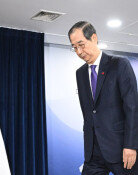A Rice Plain of fall with Sigh and Grief
A Rice Plain of fall with Sigh and Grief
Posted October. 19, 2003 23:07,
The farmers are full of grief with a decrease in crop yields, a lower purchasing grade, and a difficulty of labor recruitment in this harvesting season. The real situation is more severe than previously thought even though it was expected due to the short sunshine duration with the occasional rain this summer and the damage brought by the typhoon Maemi.
Lower purchasing grade: In the case of 28 Rice Processing Complex, purchasing products of rice, in Chungchung-bookdo, the number of special grade and first grade products decreased by 1-4 percent compared to last year, but the second and third grade products are increased by more than 15 percent on the other hand.
The examiners of Agricultural Cooperative Rice Processing Complex said, We want to give as high a grade as possible but mostly the percentage of making brown rice by manipulating raw rice doesnt reach the standard level (78 percent) of the first grade as well as one of the special grade (82 percent).
Hwang Do-suk (45), the sales manager of Kyungju Angang Agricultural Cooperative Rice Processing Complex (largest one in Kyungsang-bookdo), said, Last year we manipulated the 130,000 bags of 40 kg rice, but we are not likely to achieve the goal (170,000 bags) this year. He added, Unexpectedly, a lot of empty heads of grain are produced so that the profits of farmers will be decreasing.
A farmer, Lee Jong-jin (49, Chungbook Chungwon-gun Ochang-myun Seobu-ri), said, I made 18 bags of 40 kg of rice per danbo (a unit of area) last year, but I expect only 15 bags this year. He also added, I presume that my earnings will be reduced by about 20 million won.
Cho kyung-ho (41, Cheonbook Limsil-gun Osoo-myun) said, Because the rice blast disease and leaf-rolling moths were active noticeably due to the low temperature, the rice was graded low, and the quantity of the harvest dropped remarkably.
Personal expenses jump up: Farmers, struggling with a low purchasing grade, are more worried about the rising personal expenses and lack of working hands. The current wages a day for cutting down a rice tree is about 50,000-60,000 won (for men), an increase of 10,000 won from last year. It is extremely hard to get labor in addition because many people go to construction sites or flood restoration sites to look for work which is easier yet also pays more.
Song Jae-won (71, Chungwon-gun Kangnae-myun Sain-ri) said, Because I have difficulty in getting labor help despite paying more than last year, my two sons and their wives, who are working for a company in the city, have to help me cut down crops. He added, Subtracting personal expenses, the price of chemicals and fertilizers, and the money borrowed from Agricultural Cooperative Bank, I have very little profit left.
Park Chang-sik (46, Kyungbook Usung-gun Danbook-myun) said, It is unquestionably obvious that fewer crops will be harvested due to typhoon Maemi and I dont feel like working with a lack of labor. Park also said, I am considering seriously about giving up farming or changing my profession next year.
The lending charge of farming machines also increased so that a working fee for cutting down the rice of a size of 200 pyong by borrowing a combine is 42,000-44,000 won, an increase of 2,000-3,000 won from last year.
The pressure of the interest of purchasing funds: Agricultural Cooperative Rice Processing Complex is anxious about its operational difficulties because the purchasing quantity has decreased, and the government decided to impose interest on the rice purchasing money (which it did not impose in 2001 and 2002). The interest is 4 percent this year.
Kim Young-in (47), the direct manager of Chungbook Okchon Agricultural Cooperative Rice Processing Complex, said, I am worried about the possibility of showing negative results because the government purchasing funds have reduced from last year and now there is an interest imposed on rice.
The Association of National Rice Processing Complex Union Members once requested that the government not to impose interest on the funds for the purchasing support in the same manner as it did last December.







